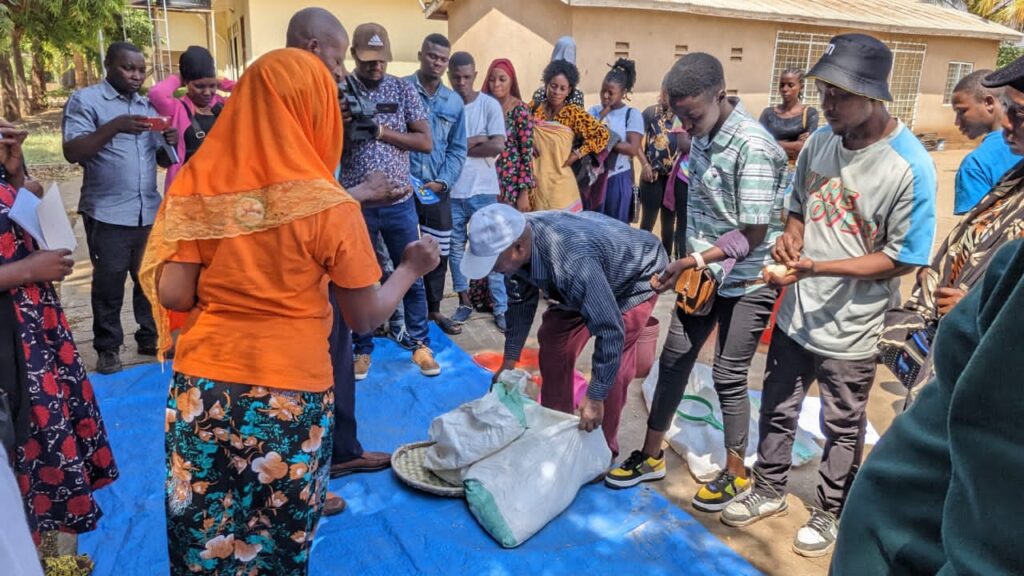Moshi, Kilimanjaro, 28th February – 02 March 2023
The International Rice Research Institute (IRRI) Tanzania office successfully completed three-day quality seed production training to accelerate genetic gain and create awareness and demand for good quality seeds of improved, climate-resilient, and high-yielding rice varieties.
The training combined theoretical and practical sessions and was organized in partnership with the Kilimanjaro Agricultural Training Center (KATC), Tanzania Agricultural Research Institute (TARI), Tanzania Official Seed Certification Institute (TOSCI), Agricultural Seed Agency (ASA), and Kilimo Trust (KT). Ms. Nice Wilfred Ntupwa from the Ministry of Agriculture, George Iranga from IRRI Tanzania, and the acting principal of (KATC) Peter Aloyce Kabelo officiated the opening of the training.
A total of 30 farmers from 22 regions and 30 district councils benefited from the training program which covered seed quality, seed legislation, seed production planning, preparation of seeds for planting, crop establishment and management, proper harvesting, seed drying, and storage and packaging. Participants also had the opportunity to visit seed production farms and gain practical experience in quality seed production. The training also emphasized the importance of good water management practices, soil analysis before applying fertilizers, maintaining cleanliness on the farm, and eliminating impurities from seed lots to ensure high quality and high germination rate.
The training specifically focused on Quality Declared Seed (QDS) to equip stakeholders in the seed value chain, including women and youth, farmer groups, individual farmers, and government institutions with the necessary skills and knowledge to become proficient in quality seed production. Participants expressed their satisfaction with the content and delivery of the training and noted that it would contribute to improving food security and livelihoods in the region.
Mr. Iranga highlighted the low awareness of improved high-yielding and climate-resilient rice varieties and the poor availability and accessibility of affordable quality-assured seeds, which have been the key challenges in seed systems.
“To overcome these challenges, IRRI and its partners have been promoting improved rice varieties since 2018 in different district councils where rice is an important crop. This year, IRRI has funded four Tanzania Agricultural Research Institute (TARI) stations to establish a total of 120 sites of demonstration plots of nationally released varieties in different district councils,” Mr. Iranga said.
He added that the training aims to to promote entrepreneurship opportunities for existing informal seed producers and emerging women and young farmers’ collectives in Tanzania.
Speaking on IRRI’s long-standing research and capacity development partnership with the Government of Tanzania, IRRI-Africa Regional Director Dr. Abdelbagi M. Ismail, Regional Director, emphasized the value of sustaining these partnerships to ensure that the smallholder farmers have access to the best quality seeds and that the highest seed production, certification and quality assurance standards are met.
“The seed value chain plays a vital role in Tanzania’s agricultural sector, which is the backbone of the economy. IRRI-Africa remains committed to supporting the development of the agricultural sector in Tanzania and is grateful to its partners for their support in facilitating this training. This initiative is just one of many activities aiming at improving the quality and quantity of seeds produced in the country by various seed producers, from the public, private and cooperative sectors. We continue to join efforts to promote sustainable farming practices, increase crop yields, and contribute to the country’s economic growth,” Dr. Ismail said.
Participating farmers have received TOSCI certificates that will enable them to form groups for QDS seed production and marketing, provided they meet the other necessary TOSCI requirements.
According to Deogratius Cosmas, the Tanzania Seed Systems Specialist at IRRI, the recent workshop equipped farmers with the necessary skills and knowledge to enhance the quality of their rice seed, increase yields, and contribute to the country’s economic growth. “This training is essential to promoting sustainable farming practices and reducing post-harvest losses, which are crucial for Tanzania’s food security and economic growth,” he noted.
Emmanuel Mwakatobe, a Seed Technologist at the Tanzania Official Seed Certification Institute (TOSCI), emphasized the critical role of the seed industry in agriculture, stating that good quality seeds are essential for achieving food security and increasing crop yields. TOSCI plays a vital role in regulating the seed industry and ensuring that all seed-related activities are conducted legally and professionally to maintain the quality of seeds in Tanzania.
Shao Peter Higin, one of the presenters at the workshop, highlighted the significance of good water management practices in significantly increasing crop yields and seed quality. Farmers need to adopt best water management practices, which would increase yields and improve seed quality and promote efficient use of other inputs such as fertilizers and herbicides.
Robert Mwaluseke, Project Manager at Kilimo Trust and a presenter at the workshop, stressed that having a comprehensive seed production plan allows farmers to meet the growing demand for high-quality seeds, manage their resources effectively, and maximize their profits. The seed production training in Moshi provided hands-on experience for attendees and empowered them to take control of their seed production operations.
Emmanuel Mwakatobe reiterated the importance of seed quality certification, which benefits farmers and contributes to the overall growth and development of the agriculture sector in Tanzania. TOSCI’s certification process, which involves collaboration with various stakeholders, ensures that farmers have access to high-quality seeds that are authentic, consistent, and stable.
Participants in three-day quality seed production training in Moshi, Kilimanjaro, to promote food, income, and nutrition security in Tanzania through hands-on experience and theoretical sessions with partners in the seed value chain.



